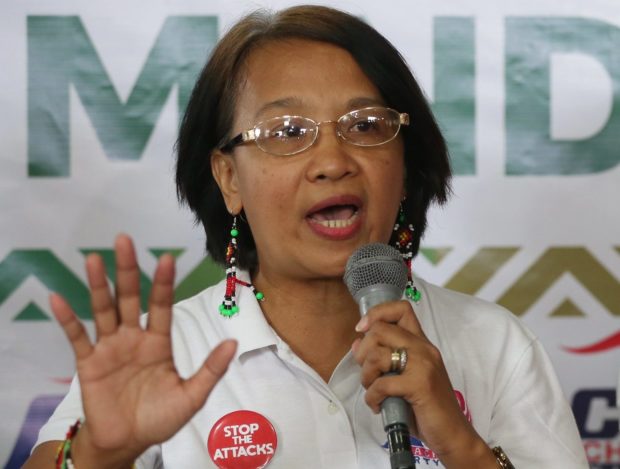
Alliance of Concerned Teachers Rep. France Castro. (FILE PHOTO)
MANILA, Philippines — The possible amendments to the Electric Power Industry Reform Act of 2001 (Epira) should not be about giving the president emergency powers in the face of a power crisis, ACT Teachers Rep. France Castro said on Thursday.
Castro in a statement referred to the amendments pushed by the Department of Energy (DOE), presented before the House committee on energy on Tuesday.
According to the lawmaker, instead of mulling to give a sitting president the emergency powers, the correct move should be to ensure that corporations commit to the delivery of cheaper electricity
“Hindi solusyon ang emergency powers ng Presidente sa problema ng krisis sa kuryente sa bansa (Emergency powers for a president is not the solution to the power crisis in the country),” Castro said.
“What we need are government-owned power plants that are efficiently operated to off set the profit hungry motives of many private generation companies. We also need the National Grid Corporation of the Philippines (NGCP) to be owned and controlled by the government so as to prevent intrusions of foreign entities on our power sector. It should also not be made into another reward for the cronies of this administration,” she added.
In the proposed measure that DOE presented, a provision stated that the president may, “upon the recommendation of the DOE, issue a declaration of electric power crisis in times of critically low electricity supply or unusually high electricity prices”.
“During an electric power crisis, the DOE shall issue temporary measures to mitigate the impact on the consumers and other initiatives for the efficient allocation and conservation of energy; provided, that the effectivity of such issuances shall continue until the lifting of the declaration of the electric power crisis by the President,” DOE’s bill read.
READ: DOE wants EPIRA to ban foreign power distributors
But Castro said the goal should not be towards mitigating measures in brownouts, but the eradication of brownouts and red alert situations at the NGCP.
“Hindi uubra na kada na lang magkakaroon ng brown outs o red alert sa power situation sa bansa ay gagamitin ng presidente ang emergency powers niya pero ang resulta lang naman ay mas mataas na singil sa kuryente ng mga consumers,” Castro claimed.
(It won’t do that every time there is a brownout or a red alert power situation in the country, the president would resort to using his or her emergency powers, which would only result in higher electricity costs for consumers.)
“Sa mga panukalang galing sa [DOE] para repasuhin ang [Epira] ay parang di naman para bumaba ang singil sa kuryente ang kalakhan kundi para lang mas makapasok pa at lumawak ang negosyo ng mga sinasabing oligarchs na malapit ngayon sa Malacañang sa power sector,” she added.
(The proposals from DOE to amend the Epira does not seem to lower the price of electricity for all; instead, it only opens avenues for oligarchs in the power sector who are close to Malacañang today to widen their business interests.)
Aside from the emergency powers provision, Section 5 of DOE’s proposed bill would amend R.A No. 9136’s Section 7 to include additional paragraphs, which will effectively prohibit firms controlled or acting on behalf of foreign governments from doing electric transmission business in the Philippines.
Foreign government-backed enterprises would be asked to divest their investments in 10 years after, should the bill be enacted into law.
DOE Policy Legal Service Division officer-in-charge Dexter Suyat said told the House panel that the amendments were placed align “the Epira with the Public Service Act as amended.”
The bill — if this provision is retained in the version passed by Congress and signed by the President — also mandates that existing entities acting on behalf of the foreign government cannot make disclosures and extend assistance to other governments in the interest of the Philippines’ national security.
Epira was signed in 2001 by former president and now Senior Deputy Speaker Gloria Macapagal Arroyo, in a bid to liberalize the power industry and bring power prices down without sacrificing quality.
However, several pro-consumer and progressive groups noted that the Epira turned to be anti-people and pro-corporation instead.
RELATED STORIES:
13 years after, Epira remains ‘work in progress’—solon